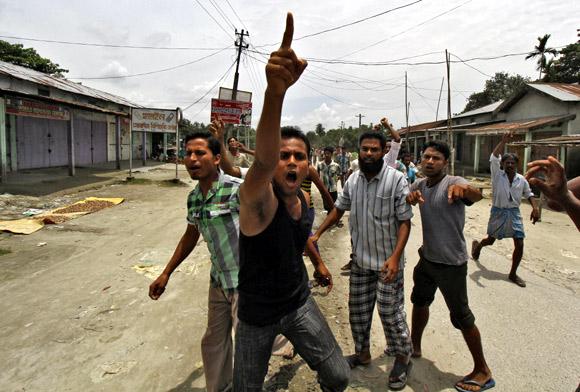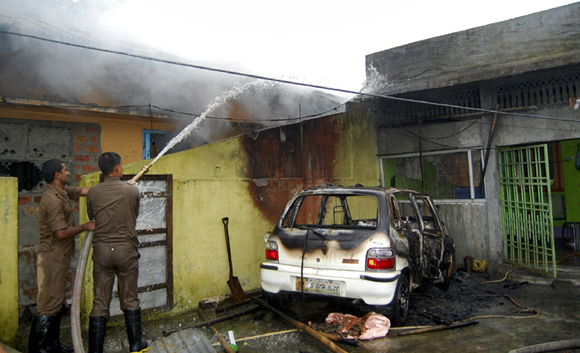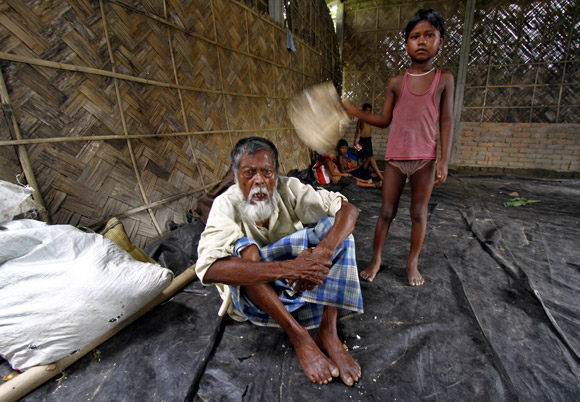 | « Back to article | Print this article |
Why we must take note of the warning signs in Assam
It is time we consider a residential permit system for economic migrants. With this the migrants will enjoy all benefits other than the right to vote.
This single measure of regularising economic migrants will defeat the nefarious designs of the 'vote-bank' politicians. Else, we are storing trouble for the future, says Colonel (Dr) Anil Athale (retd).
I was less than six months in charge of the operations branch at the Eastern Command headquarters in Kolkata when I was rudely awakened by an urgent telephone call from Tripura on the morning of June 8, 1980.
The army unit in Agartala, the capital of Tripura, reported that tribals had surrounded a refugee camp at Mandai, 60 kms from the capital, and massacred over 300 Bengali men, women and children who had taken refuge there to escape violence unleashed by the tribals.
As an officer dealing with internal security it came as a bolt from the blue as there was very little warning and most of the attention and resources of the Eastern Army were concentrated in dealing with the anti-foreigners agitation in Assam and separatist violence in Manipur.
Tripura is a classic example of how a change in demography can lead to internal strife.
Please click NEXT to read further...
Why we must take note of the warning signs in Assam
The army's Eastern Command had its hands full at that time. There was an ongoing insurgency in Mizoram and Nagaland, students agitations that had metamorphosed into an insurgency and an anti-foreigner agitation in Assam that had shut the oil wells.
It was the example of Tripura where the indigenous people were outnumbered by the immigrants, that was the motive behind the Assam agitation.
Thirty-two years later, we are seeing a replay of a Tripura-like crisis in the Bodo-inhabited areas of Assam. With friction and tension in the air, it took just a minor spark to lead to a conflagration.
The current violence also shows clearly the limits of State power when violence spreads to remote villages. No army or police force can control such a situation.
Having dealt with the Northeast for some time one is struck by the fact that the government of the day has not only failed to address the legitimate fears of indigenous people but has actually been responsible for it.
It is absolutely true that like in case of Mexico and the US, illegal migration from poorer countries is an issue that defies a solution.
Please click NEXT to read further...
Why we must take note of the warning signs in Assam
Like the forces of nature, people tend to flow from areas of high demographic density to sparsely populated regions.
Like the long Mexico-US border, the India-Bangladesh border, that is criss-crossed by rivers, is difficult to police.
Unlike the US, in the case of Assam and Bengal, the migration has actually been encouraged by the government of the day.
These migrants are then granted citizenship on the basis of ration card and form a vote bank for the politicians in power. Migrant labour is protected by the landholders as they are prepared to work for lower wages.
The police and government authorities are hand in glove as they make a quick buck by threatening the migrants.
The trouble is currently confined to the Bodo-dominated areas. It is only a matter of time before it spreads to other parts of Assam. Assam is a gateway to the Northeast and later to Southeast Asia. India has ambitious plans for its 'Look East' diplomacy.
Please click NEXT to read further...
Why we must take note of the warning signs in Assam
Assam is the most crucial state from the point of view of defence of the entire Northeast. All communications to the smaller states of the Northeast pass through Assam.
Instead of nurturing Assam we have frittered away the goodwill of its people and are more concerned with the migrants who are not even citizens of our country.
There is some awareness of the role changing demography plays in international relations. Foreign Secretary Ranjan Mathai recently highlighted the issue while releasing a book at the Institute for Defence Studies and Analyses.
In the not too distant future, a similar population explosion in Pakistan is likely to lead to 'economic migrants' coming into our country from the west as well. It is time we formulate a policy to deal with this issue.
Taking a leaf from the American book, it is time that we consider a residential permit system for economic migrants. With this the migrants will enjoy all benefits other than the right to vote.
The migrants, especially from Bangladesh, should they opt for a 'residential permit', should be allowed to repatriate their earnings home.
This will incentivise a large number of illegal immigrants as many have left their families in their home country. A residential permit status will also free them from harassment by the local police and give them a chance to visit their country.
Please click NEXT to read further...
Why we must take note of the warning signs in Assam
Some years ago the Maharashtra government attempted to tackle the issue. But in the face of apathy from the central government and Bengal that claimed the Bangladeshis to be Indians, the attempt failed.
Every country in the world regulates the flow of population into their land. No country grants citizenship as a right to migrant labour. Close to a million Indians live and work in the Middle East on worker permits. Why should India be an exception?
This single measure of regularising economic migrants will defeat the nefarious designs of 'vote-bank' politicians. Else, we are storing trouble for the future.
One is, however, struck by the media attention that this event has grabbed. There is a constant theme of plight of internal refugees and displaced persons living in misery. One wonders why we do not even occasionally remember the Kashmiri Pandits who are similarly displaced!
Has the 'Stockholm Syndrome' so completely overwhelmed our liberals!
Colonel (Dr) Anil Athale (retd) is coordinator of the Indian Initiative for Peace, Arms-control & Disarmament.




